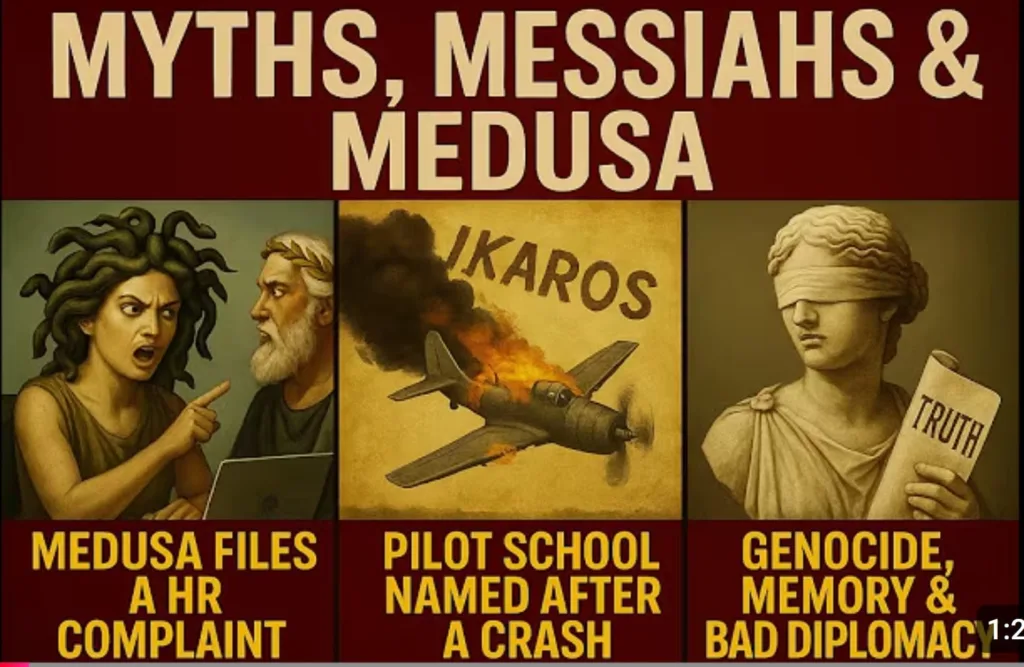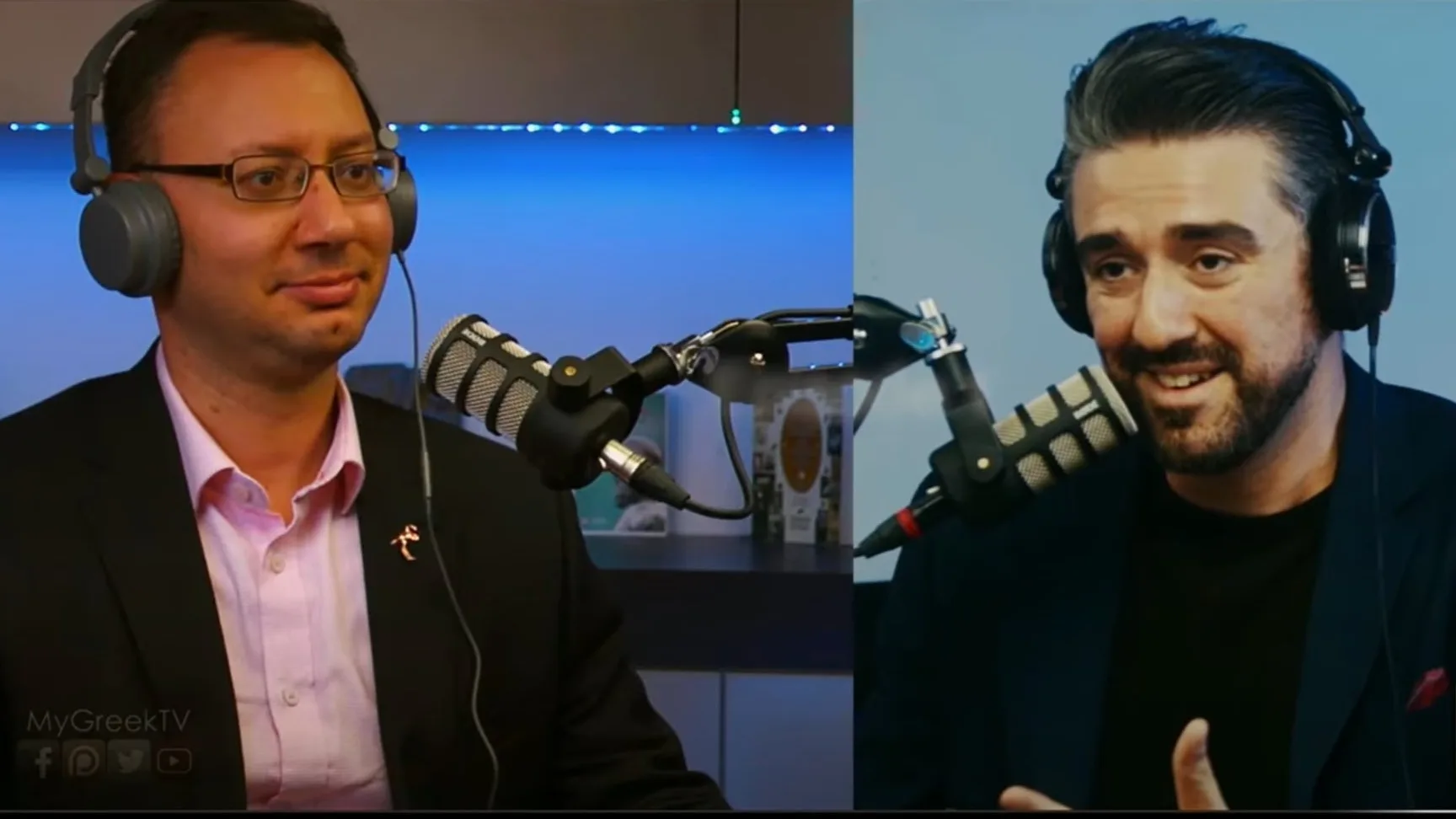In an era saturated with disposable content and surface-level engagement, Youtube My Greek TV channel’s Romaic Ruminations emerges not only as a podcast but as a quiet revolution.
Hosted by Dean Kalimniou and Peter Stefanidis, two figures deeply embedded in Melbourne’s Greek intellectual and cultural scene, the show is both a homage to and a reimagining of Hellenism. It is, as the title suggests, an invitation to ruminate: to chew thoughtfully, not just on the grandeur of Greece’s past, but on its living, breathing legacy.
While many cultural podcasts aim for accessibility by flattening nuance, Romaic Ruminations does the opposite. It is unapologetically erudite, richly referential, and unafraid to plunge into the murky depths of history, theology, philosophy, and diaspora politics. And yet, paradoxically, this is exactly what makes it so accessible, not because it dilutes knowledge, but because it dignifies the audience. Whether you’re a seasoned Hellenophile or simply curious, Romaic Ruminations never talks down; it talks across, besides, and beyond.
A new agora for an ancient identity
The title alone is worth unpacking. “Romaic” refers to the later, often overlooked phase of Greek identity, the Byzantine, the Eastern Roman, the Orthodox. It is a word heavy with centuries of neglect, especially in Western narratives that fetishise classical antiquity while dismissing Byzantium as decadent or obscure. By centring on the Romaic, Kalimniou and Stefanidis make a political statement: Hellenism did not end with Plato or Pericles. It evolved, adapted, and persisted in monasteries, in migration and in memory.
“Ruminations,” meanwhile, signals something countercultural in the digital age: reflection. The podcast refuses speed. It meanders, lingers, questions. Like the Socratic dialogues it echoes, it unfolds through exchange, sometimes anecdotal, sometimes scholarly, always thoughtful. This is not infotainment; it is a philosophical stroll in an aural garden.
The hosts
Kalimniou is no stranger to complex discourse. A lawyer, translator, poet, author and playwright, his writing is known for its lyrical density and its ability to make saints, syntax, and satire dance in the same sentence. In Romaic Ruminations, Kalimniou plays the role of the riddling seer, offering obscure facts, etymologies, and textual exegesis with the confidence of a monk-scholar and the humour of a well-read cynic.
Indeed, part of the podcast’s compelling nature lies in Kalimniou’s innate, side-splitting humour, dry, self-effacing, and disarmingly intellectual. His turns of phrase can pivot from Byzantine canon law to sharp one-liners about the private lives of Greek pop singers with a seamlessness that defies academic solemnity. “Hellenism,” Kalimniou quips in one episode, “is not so much a state of being as it is a perpetual state of exegesis… usually while cutting up loukoumoskoni with a stolen credit card.” It’s a tone that transforms even the most abstract topics into irresistible banter.
Stefanidis, by contrast, brings a grounded charisma, asking the questions that tether the discussion to the world of lived experience. If Kalimniou is the library, Stefanidis is the town square. Their chemistry is part of the show’s alchemy, neither outshines the other, and both are better together. As Stefanidis puts it: “There are moments when Dean will drop a reference to a 6th-century Cappadocian theologian I’ve never heard of, followed by a joke about Greek-Australian BBQ etiquette, and somehow, it makes perfect sense. That’s the genius.”
This balance is crucial. Too many podcasts fall into the trap of host ego or overproduction. Romaic Ruminations feels like eavesdropping on a conversation between two well-read friends who trust the listener to keep up, and that trust is empowering.
Innovation through depth
In terms of form, Romaic Ruminations is innovative precisely because it refuses gimmickry. There are no sound effects, no artificial suspense, no attempts to go “viral.” Instead, it innovates by content curation and thematic audacity. Where else can one hear an extended meditation on the symbolism of the Discobolus statue followed by a discussion of Pontian genocide memory politics? Where else do you move seamlessly from steamy Greek-themed romance novels to critiques of how children’s stories shape Greek identity?
The podcast challenges both Greek and non-Greek listeners to reconsider assumptions. For Greeks in the diaspora, it offers more than nostalgia: it offers a framework for identity that is not static but dialogical. It says: you are not just a consumer of a distant past; you are its interpreter, its inheritor, and its challenger. For non-Greeks, it opens doors into aspects of Greekness rarely seen in mainstream portrayals: Orthodox metaphysics, Asia Minor trauma, the colonial echoes in classical appropriation.
This breadth is not incidental. It reflects a deeper thesis: that Hellenism, in all its forms, cannot be contained within national borders or frozen time periods. It must be ruminated upon, unpacked, contested, laughed with, and occasionally wept over.
A diasporic archive in real time
In many ways, Romaic Ruminations functions as a living archive. It captures what formal institutions often fail to record: the voices of everyday philosophers, the internal contradictions of diasporic life, the intellectual restlessness of a culture in motion. In doing so, it fills a lacuna in both Greek Studies and diaspora discourse. It does not seek to define Greekness, but to complicate it.
Moreover, it provides an example of what intellectual production can look like outside of the academy. Kalimniou and Stefanidis are not professors, and yet their rigour would put many to shame. They read widely, speak carefully, and cite generously, not to posture, but to illuminate. In this, the podcast is a quiet act of democratising knowledge.

Importance beyond Hellenism
While its subject matter is deeply rooted in Greek culture, Romaic Ruminations offers a model of how minority cultures can use digital platforms to assert complexity in a world that too often demands simplification. Its lessons on memory, myth, language, displacement, resonate far beyond Hellenic confines.
For anyone concerned with the survival of intellectual culture in a clickbait world, Romaic Ruminations is a beacon. It reminds us that there is an audience, hungry, thoughtful, generous—willing to engage with difficult, beautiful things. It reminds us that the podcast format, far from being trivial, can serve as a vessel for deep cultural transmission.
And perhaps most importantly, it reminds us that ruminating is a radical act. To pause, to reflect, to speak with care, these are not just stylistic choices. They are ethical ones.
Romaic Ruminations is thus more than a podcast. It is a philosophical salon, a diasporic chronicle, and a cultural intervention. It affirms that Hellenism is not a relic but a dialogue. And it proves that even in the age of algorithmic distraction, there is space, and appetite, for the slow burn of meaningful conversation.
Whether you are Greek, Greek-adjacent, or simply curious about the deeper undercurrents of cultural identity, Romaic Ruminations offers a listening experience as rich, layered, and paradoxical as the very tradition it invokes.
Let the ruminations continue.
